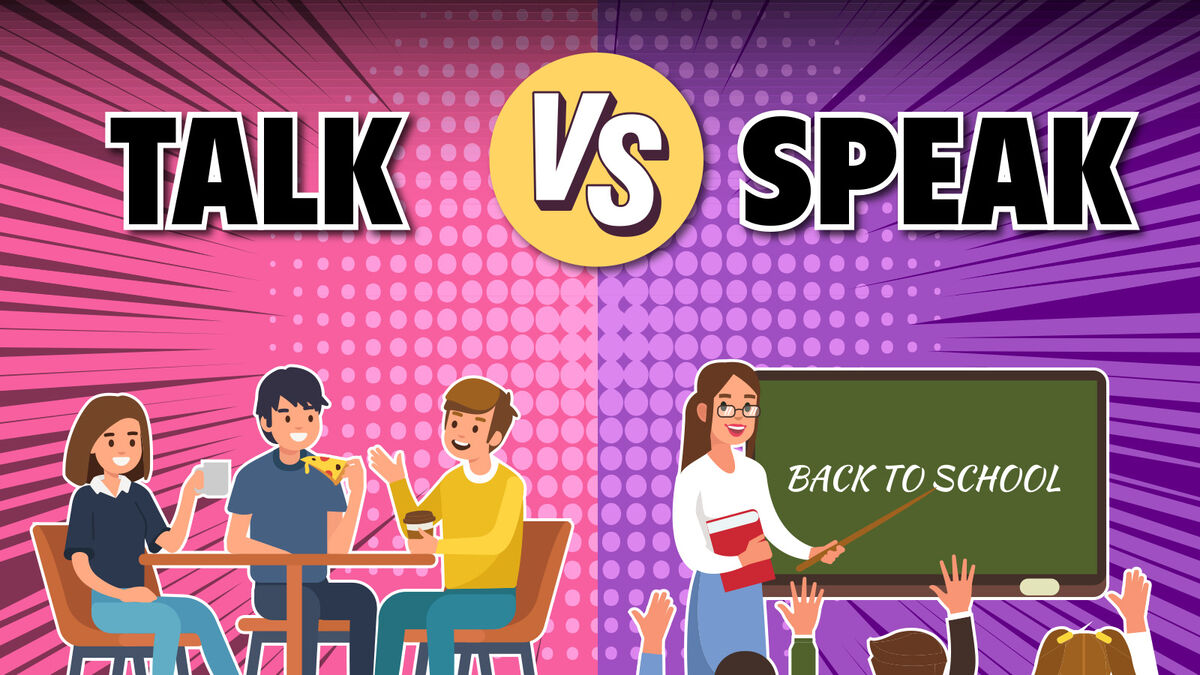
Is it “to talk” or “to speak”? That is the question. Shakespeare probably didn't think about it, but you should. Get a quick and easy guide for how to use “talk” vs. “speak” correctly through simple examples.

Differences Between “Speak” vs. “Talk”
This one might seem like a no-brainer. “Speak” and “talk” are both verbs that have to do with communication. So, you should be able to use them interchangeably, right? While they both involve the relaying of information, usually in a verbal sense, they can’t be used interchangeably all the time.
Here’s why:
- Speak is used in formal sentences to provide information. You are giving information to another person like in a speech. The communication is mostly in one direction. "Speak" also gives a sense of importance.
- Talk is used in an informal sentence to have a conversation. You're having a simple chat with someone. It is a two-sided conversation, with both parties participating equally.
To keep it nice and simple, you can look at how “speak” is used in a formal way first.
Using “Speak” in a Formal Sentence
“Speak” is more formal and adds a sense of importance or urgency. You’ll see “speak” used more in professional relationships like with your boss or teacher.
- Mr. Mathews needs to speak with you.
- You need to speak to the principal.
- He will speak to you when you get to school.
- Why does she need to speak with me?
- The manager will speak with you in a few minutes.
- After filling out the accident report, the police need to speak with you.
- I’m speaking to you.
Let’s see how “talk” changes the tone of the conversation.
“Talk” for Informational Sentences
When you use “talk” in a sentence, it is more like a casual chat with friends or family. The word “talk” is more laid back.
- Can we talk about how hot Mattie is?
- The girls always talk and giggle at their lockers.
- Can we talk about that?
- Do you want to talk about it?
- I really think that we should talk.
- She was totally talking behind my back.
- I really can’t talk about this now.
- Can we talk for a minute?
See how the tone of the sentence completely changes from "speak" to "talk"? However, that isn’t the only difference between these two words.
“Speak” and “Talk” With Prepositions
Both “speak” and “talk” can be used with the preposition “to.” For example, you might say:
- I need to speak to you.
- Can I talk to you?
- He needs to speak to you.
- He needs to talk to you.
- Claire needs to speak to you.
- Claire is waiting to talk to you.
You can also use the preposition "about" with either "speak" or "talk." However, you'll notice the difference between the more one-sided "speak" compared to the more conversational "talk."
- Let's talk about our relationship.
- Mrs. Connell is here to speak about mental health.
- I'm going to talk about Jerry's grades with him.
- Pietro says he would like to speak about bullying at the assembly.
- Can we just talk about this book? It's so good!
“Speak” is more commonly used with the preposition “with.” It is typically in a formal request like:
- Mr. Thomas needs to speak with you.
- May I speak with you?
- She needs to speak with you.
- The boss must speak with you.
- I must speak with you.
It’s Important To Know Who’s “Speaking” or “Talking”
Another subtle difference between “speak” and “talk” is the number of people conversing. When words are coming from only one person (as in a speech), you’ll notice the use of the word “speak.” However, when two people are having a conversation with each other, “talk” will be used.
See how this works through examples.
- Billy is speaking.
- She avoids eye contact when she speaks.
- It is important to listen to the teacher when she speaks.
- I think I speak for everyone.
- Kate and I were talking.
- Did you hear what they were talking about?
- We need to talk.
- What do you want to talk about?
- Joanne would talk on the phone for hours with her best friend.
“Speak” for Fluency
In language proficiency, you will always “speak” not “talk.” You wouldn’t tell your friends that “you talk two languages.” Instead, you would tell them that “you speak two languages.” View a few more examples to see how this is done.
- Johnny can speak German.
- I can speak French.
- I didn’t know you could speak Russian.
- They all speak Dutch.
- She doesn't know how to speak Hindi.
It’s All About Tone
Depending on whether you use “speak” or “talk,” it can change the tone of the conversation. It can go from a casual chat with a friend to a more formal conversation with a colleague. Since you successfully cleared up the confusion of “speak” and “talk,” you might want to give “should” vs. “shall” a try. You never know when you will utilize this information!